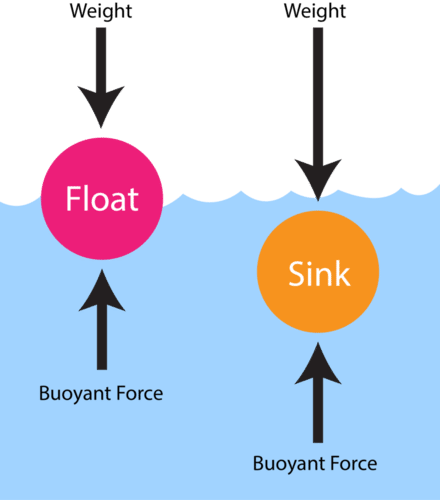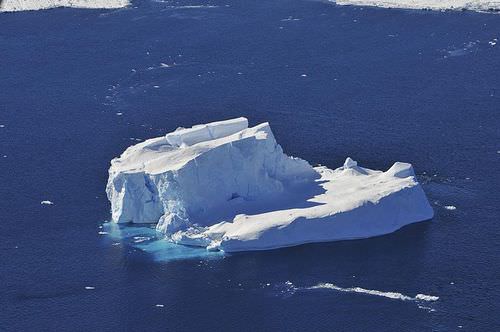12.6 浮力
章节大纲
-
What could be more refreshing than floating in cool water on a hot summer day? Fluids can exert a special force that allows people and things to float in them. The force is called buoyant force .
::在炎热的夏季日子里漂浮在冷水中,还有什么比这更令人振奋的呢?流体可以施加一种特殊的力量,允许人们和事物在水中漂浮。 水力被称为浮力。What Is Buoyant Force?
::什么是"浮力"?Buoyant force is the upward force that fluids (such as water or air) apply to any object placed in them. The ability of fluids to exert this force is called buoyancy . What explains buoyant force? Fluids can exert pressure in all directions. However, the pressure increases as we move deeper into the fluid. Therefore, the fluid below an object exerts greater pressure than the fluid above it. This pressure difference creates an upward force on the object called buoyant force. In other words, the object experiences an upward force equal to the of the fluid it displaces. This is why objects less dense than the fluid they are in will float, while denser objects will sink. You can see in the Figure how this works. Buoyant force explains why the girl pictured above can float in water.
::浮力是液体( 如水或空气) 的上方力量。 流体施加这种力量的能力被称为浮力。 是什么解释浮力? 流体可以在各个方向施压。 但是, 当我们深入流体时, 压力会增加。 因此, 物体下方的液体会比上面的液体施加更大的压力。 这个压力差异会给被放在其中的任何物体造成一种向上的力量。 换句话说, 物体的上方力量相当于它流出的液体。 这就是为什么物体比它们所流的液体要低一些, 而较稠密的物体会沉没。 您可以在图中看到这个物体是如何工作的。 浮力可以解释为什么上面所描绘的女孩可以在水中漂浮。Q : You’ve probably noticed that some things don’t float in water. For example, if you drop a stone in water, it will sink to the bottom rather than floating. If buoyant force applies to all objects in fluids, why do some objects sink instead of float?
::问题:你可能已经注意到有些东西不会漂浮在水中。例如,如果在水中投下一块石头,它就会沉到水底而不是漂浮。如果浮力适用于液体中的所有物体,为什么有些物体会沉没而不是漂浮?A : The answer has to do with how the object’s weight compares to the buoyant force.
::答:答案在于物体的重量如何与浮力相比。Weight and Buoyant Force
::重量和浮力部队Weight is a measure of the force of gravity pulling down on an object, whereas buoyant force pushes up on an object. Which force is greater determines whether an object sinks or floats. Look at the Figure . On the left, the object’s weight is the same as the buoyant force acting on it, so the object floats. On the right, the object’s weight is greater than the buoyant force acting on it, so the object sinks.
::重力是重力拉下物体的强度的尺度,而浮力则推上物体。哪种力更能决定物体是汇还是浮。看看图。在左边,物体的重量与浮力的重量相同,所以物体的重量会浮起来。在右边,物体的重量大于浮力,物体的重量则大于浮力。Because of buoyant force, objects seem lighter in water. You may have noticed this when you went swimming and could easily pick up a friend or sibling under the water. Some of the person’s weight was countered by the buoyant force of the water.
::由于浮力的缘故,物体在水中看起来较轻。 当你游泳时,你可能注意到这一点,很容易在水下捡到朋友或兄弟姐妹。 一些人的体重被水的浮力抵消了。Density and Buoyant Force
::密度和易燃力部队Density, or the amount of mass in a given volume , is also related to the ability of an object to float. That’s because density affects weight. A given volume of a denser substance is heavier than the same volume of a less dense substance. For example, ice is less dense than water. This explains why the giant ice berg in the Figure is floating in the ocean.
::密度,或某一体积的质量量,也与物体的浮力能力有关。这是因为密度会影响重量。一个较稠重物质的体积比一个较不稠密物质的体积要重。例如,冰比水密度要低。这就是为什么图中的巨型冰山会漂浮在海洋的原因。Q : Can you think of more examples of substances that float in a fluid because they are low in density?
::问题:你能想出更多关于物质在液体中漂浮,因为它们密度低的例子吗?A : Oil is less dense than water, so oil from a spill floats on ocean water. Helium is less dense than air, so balloons filled with helium float in air.
::甲:石油比水密度小,所以从溢漏浮在海水中的石油。比空气密度小,所以气球中充斥着浮在空气中的气球。Have you ever gone fishing? Oftentimes, a sinker is attached to a fishing line in order to sink the hook deep enough in the water to bait a fish. Use the simulation below to adjust the material of the sinker so that it submerges in the water. Then, play around with the different materials to see if they will sink or float. Challenge: Can you get the rubber ducky to sink?
::你曾经钓过鱼吗? 通常,沉船者被附在钓鱼线上,以便在水中深陷钩子,诱鱼。使用下面的模拟来调整沉船材料,使其沉入水中。然后,与不同的材料一起玩耍,看它们是否会沉或漂浮。挑战:你能让橡胶鸭沉入水中吗?Summary
::摘要-
Buoyant force is an upward force that fluids exert on any object that is placed in them. Buoyant force occurs because the fluid below an object exerts greater pressure on the object than the fluid above it.
::浮力是一种向上力,对放置在物体上的物体施加液体。 浮力产生,因为物体下的液体对物体施加的压力大于上面的液体。 -
If an object’s weight is less than the buoyant force acting on it, then the object floats. If an object’s weight is greater than the buoyant force acting on it, then the object sinks.
::如果物体的重量小于其上方的浮力,那么物体就会浮出水面。 如果物体的重量大于其上方的浮力,那么物体的沉入水中。 -
A given volume of a denser substance is heavier than the same volume of a less dense substance. Therefore, density of an object also affects whether it sinks or floats.
::较稠重物质的某一体积大于较稠重物质的同一体积,因此,物体的密度也影响到它是否沉入水中或浮体。
Review
::回顾-
What is buoyant force?
::什么是强力力量? -
Why does buoyant force occur?
::为什么会出现强劲的力量? -
Why is a heavier object more likely than a lighter object to sink instead of float in water?
::为什么较重的物体比较轻的物体更有可能沉没,而不是浮在水中? -
Assume you have an ice cube and also a small rock that is the same size and shape as the ice cube. Predict what would happen if you placed the ice cube and rock in a glass of water. Explain your prediction.
::假设你有一个冰块和一个小石头, 大小和形状与冰块相同。 预测如果你把冰块和石头放在一杯水里, 将会发生什么。 请解释你的预测 。
-
Buoyant force is an upward force that fluids exert on any object that is placed in them. Buoyant force occurs because the fluid below an object exerts greater pressure on the object than the fluid above it.



